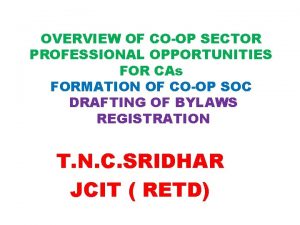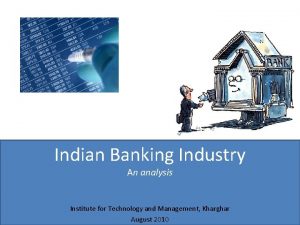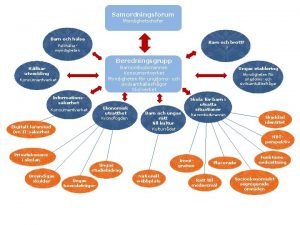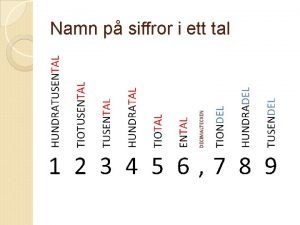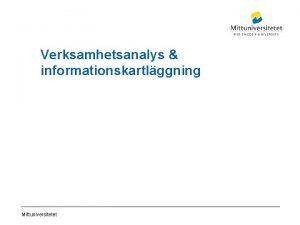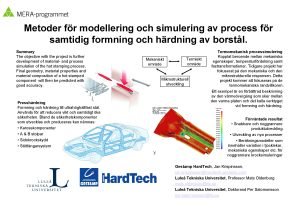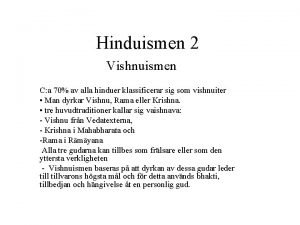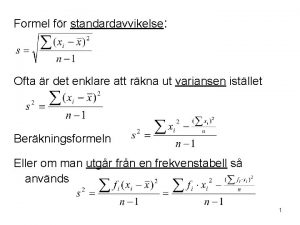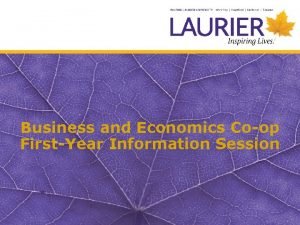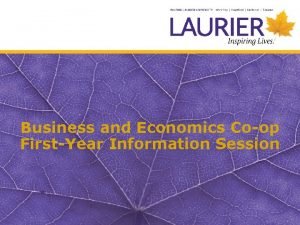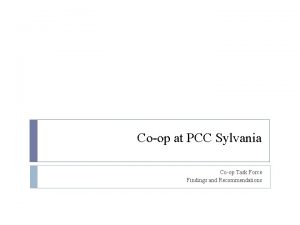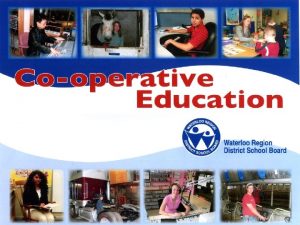OVERVIEW OF COOP SECTOR PROFESSIONAL OPPORTUNITIES FOR CAs









































































- Slides: 73

OVERVIEW OF CO-OP SECTOR PROFESSIONAL OPPORTUNITIES FOR CAs FORMATION OF CO-OP SOC DRAFTING OF BYLAWS REGISTRATION T. N. C. SRIDHAR JCIT ( RETD)

ROAD MAP • • History of co-op movement Concept of mutuality Types of co-op soc Players -visionaries -co-operators -executives -workforce -professionals -authorities-co-op dept-RBI 2

• Legislations • Role of professional • Formation-basic requirementformalities-documentations • Drafting bylaws • -salient features – • basic ingredients • -procedures –adoptionsamendments 3

OVERVIEW OF CO-OP SECTOR • An autonomous association of persons united voluntarily to meet their common economic, social, and cultural needs and aspirations through a jointly-owned and democratically-controlled enterprise. • International Co-operative Alliance (ICA) 4

MEANING OF COOPERATION • • Latin word - co- operari ‘ co ’ means ‘with’ + ‘ operari ’ means ‘to work’ Co-operation ’ means working together • Section 4 of the Co-operative Societies Act, 1912 defines cooperative society as • “a society which has as its objectives the promotion of economic interest of its members in accordance with cooperative principles. “ 5

Co-operative Society ’ means Ø A voluntary association of persons Ø working together with common economic objective Ø providing support to the members Ø self-help and mutual help Ø non-profit motive Ø pooling individual resources for group welfare Ø for common benefit 6

CO-OPERATIVES IN WORLD (HISTORY) • Robert Owen father of co-op movement • Rochdale Pioneers, manchester, UK 1844 • Weavers’ co-op • consumer—UK • Milk-Denmark • Agricultural credit--Germany 7

CO-OPERATIVES IN INDIA (HISTORY) • ‘SUCCESS OF CO-OP MOVEMENT SHOULD NOT BE MEASURED BY THE NUMBER OF CO-OP SOC FORMED, • BUT • BY THE MORAL CONDITION OF THE CO-OPERATORS’. M. K. GANDHI 8

STATE OF INDIAN FARMERS • Indian farmers • born in debt, • grow in debt & • dies in debt 9

AIM • To mitigate the ryots against exploitation by private money lenders, • Act passed in 1904 10

CO-OPERATIVES IN INDIA (HISTORY) Ø 1 st co-op in Asia formed at Kanaginahal village in Dharwar (now Gadag) district in 1914 by late Shri Siddanagowda Sanna. Ramanagaowda Patil Ø 1912 -co-op act amended to facilitate various types of co-operatives- District Central Co-op banks-Marketing co-op to enable Agricultural produce sale 11

• 1919 -As per recommendation of Chelmsford reforms the subject was transferred from central to provincial government • 1935 - R. B. I. was formed (1. 4. 1935 - All Fools Day) • 1949 -Banking Regulation Act passed 12

13

14

Rupee one: Other currency notes Issued by Government of India RBI Signed by secretary ministry of finance Governor RBI Photo/water mark One rupee coin Gandhiji since 02/10/1987 language 13 15( Nepali, Konkani added in 1996) nature Legal tender Promissory note Year of printing Till 1994 Mentioned after 2005 Serial no. once side bottom Twice- left bottom and right top 15

• 1951 -A. D. Gorwala committee formed for All India Rural Credit Survey Committee • appointed by RBI • Report submitted in 1954 • “co-op has failed in India • but it shall succeed, • there is no other way for development of the country • co-op is inevitable” 16

REFORMS • Government participation in co-op soc • Large size multipurpose co-op soc (LSMP) • Registration, Arbitration, liquidation – control with co-op dept • Licensing provisions of BR Act , CRR SLR reporting –control with RBI 17

• 1959 -Karnataka state co-op soc act • 1966 -(1/3/66)-B. R. Act amended with a new chapter ‘As Applicable ‘to Co-op Soc (AACS) • To control co-op banks- use of ‘Bank/Banker/Banking’ prohibited for those not having license under B. R. Act 18

• Credit soc can carry on banking activity except issue of cheques, DDs & money transfers. , they can accept deposit only from members & give loan only to members • 1995 -Deposit Insurance & Credit Guaranty Corporation (DICGC) 19

The Karnataka Souharda Sahakari Act, • Karnataka Souharda Sahakari Act in 1997. (Karnataka Act 17 of 2000). The act came into force with effect from January 1 st , 2001 with certain observations to modify and include specific suggestions of Reserve Bank of India with regard to Banking Business. 20

• No Government share capital, loan, subsidy or any financial help • No Government control • AGM supreme • Auditor appointment to be decided by AGM and not government appointed • Option to choose auditors from panel published by co-op dept • Auditor must complete audit before last date of august every year as per sec 63 of KCS Act 21

• Complaints to Karnataka state Souharda Federal Corp Ltd • 2 parallel Acts free flow migration • KCS Act for only co-op Hsg soc –others optional • Conduct of Election by Co-op election commissioner • Disputes regarding election only to jurisdictional civil court 22

THE CONSTITUTION (97 TH AMENDMENT) ACT, 2011 WITH EFFECT FROM 15 TH FEBRUARY 2012. Ø Constitution of India divided into twenty two parts, 395 articles and twelve schedules. Ø Part-III – Ø Fundamental Rights (Articles 12 to 35). Ø Article 19(c) to include under right to freedom the right to citizens to form cooperative societies. 23

Part-IV Directive Principles of State Policy • Article 43 B • “Promotion of co-operative societies – The State shall endeavor to promote • voluntary formation, • autonomous functioning, • democratic control and • professional management of • co-operative societies” 24

Part IXB Ø – Article 243 ZH to Article 243 ZT Ø The Co-operative Societies – inserting articles relating to the co-operative societies. • This part gives out the co-operative societies related provisions of • incorporation, • board structure, • election of members, • application of this part among others. • Article 243 ZR • under this part also specifies that these provisions shall also apply to multi-state co-operative societies. 25

After Part IXA of the constitution, Part IXB was inserted to accommodate state vs. centre roles. It inter alia provides for: • (i) Incorporation, regulation and winding up of cooperative societies based on the principles of voluntary formation, democratic member control, member economic participation and autonomous functioning; 26

• (ii) Specifying the maximum number of directors of a co-operative society to be not exceeding 21 members; • (iii)a fixed term of 5 years from the date of election in respect of the elected members of the board and its office bearers; and an authority or body for the conduct of elections to a cooperative society; 27

• (iv)a maximum time limit of 6 months during which board of directors of a cooperative society could be kept under supersession or suspension; • (v) independent professional audit; • (vi) right of information to the members of the co-operative societies; • (vii) Empowering the State Governments to obtain periodic reports of activities and accounts of co-operative societies; 28

• (viii) reservation of • (1/6)seat for OBC • (1/6) seat for the Scheduled Castes or the Scheduled Tribes and • (2/6) seats for women • on the board of every cooperative society, which have individuals as members from such categories; and • (ix) Penalties in respect of offences relating to co-operative societies. 29

CLASSIFICATION OF COOPERATIVES üAgriculture/ Forestry üNon- Agriculture üBanking/ Credit Unions 30

THE DOCUMENTS REQUIRED FOR REGISTRATION OF FLAT OWNER’S HOUSING SOCIETY 1) 7/12 extract of the land or property card. 2) Certificate from the competent authority regarding non-agricultural land 3) The order regarding applicable/non applicable of land ceiling Act 31

4) Construction layout approved by the competent authority 5) Letter of sanction for starting construction 6) Certificate regarding completion of construction work 7) Development Agreement if the land is taken for development 32

8) Letter of Power of Attorney of the land 9) Title search report of the land 10) The registered agreement of purchases of the flat with necessary stamp duty paid 11) Architect Certificate regarding construction 33

12) At least ten members are necessary for registration of society. 13) If the land is given by the government or undertaking agency of the government then its guarantee letter 14) No objection certificates from the Charitable Commissioner if the land is of Trust. 15) Certificate of the competent authority regarding non-agricultural plot 34

16) Application for Registering Society (A form) 17) Table giving information of society (B ) 18) Table giving details of the members (C ) 19) Statement of Accounts of the Members (D ) 20) Notarized Guarantee letter by the Chief Promoter of the society on the stamp Paper of Rs. 100/21) List of Members 35

22) Scheme of the Society 23) Application for reserving name 24) Notarized Guarantee letter by the Builder, Promoter on the Stamp Paper of Rs. 100/-Affidavit of Members (Affidavit of Minimum 10 Promoters) 25) Two copies of bye laws of the Society approved by the Commissioner, Cooperation and Registrar, Co-operative Societies 36

26) Proof of the bank balance of the promoter member (deposit of each share of Rs. 500 and admission fee of Rs. 100), after getting permission for reservation in the District Central Co-operative Bank 27) Challan of Rs. 2500/- deposited in the Government Treasury Registration fee for the Housing Society of Backward class is Rs. 50/- 37

PROFESSIONAL OPPORTUNITIES- CO-OP SECTOR 1. Registration of housing society 2. Drafting bye laws of the Society 3. Legal opinion 4. Legal documentation and advice on Sale/Purchase/Lease of Property 5. Verification of Title Deed of the Property 6. Finance Agreements 7. Building, Development and Construction Contracts 8. Real estate investment and development projects 38

9. Taxation and Accounting 10. Registration and Stamp Duty 11. Advisory in Foreign Direct Investment in Real Estate 12. Valuation of property 13. Arbitration and Consulting 14. Litigation Support 15. Tax Appeals 16 Compliance with Development Control Regulations 39

17. Acquisition, sale and transfer of Immovable property in India by Non Resident Indians and Persons resident outside India 18. Real Estate Venture Capital Investment Negotiations 19. Property Specific Joint Venture agreements 20. Green Building consultancy 21. Statutory compliances 22. Statutory Audit 23 Internal Audit 24. Conveyance and Deemed Conveyance 40

25. Project Management Consultancy 26. Feasibility Report in case of redevelopment of property 27. Drafting Agreement with builders 28. Writing articles in cooperative/NPO related magazines and other publications 29. Participating as speaker in conferences 30. Communicating with people related to cooperative activities 41

31. Building a cooperative information website 32. Writing books on topics covered under cooperative 33. Projecting oneself as a cooperative society expert 34. Reaching out to the prospective service receivers 35. Using social media to reach more number of people related to Cooperative societies 42

36. Increase expertise in the field of Cooperative society by undertaking capacity building initiatives 37. Registration of co-operative society under various applicable labour legislations, if applicable 38. Obtaining Licenses 39. Completion of Forms 40. Submission of Returns on a regular basis 43

FORMATION OF CO-OP SOC • Fundamental right • -cannot be refused • Sec 5 • object should be • economic interest of members • in accordance with principles of cooperation (mutuality) 44

THE BASIC GUIDELINES FOR THE FORMATION OF COOPERATIVES UNDER KARNATAKA SOUHARDA SAHAKRI ACT, 1997 • There should be at least ten persons. • These persons should be from different families. • These persons should be competent to enter into a contract under the Indian contracts Act 1872. 45

• He should reside in the area of operation of the Co-operative. • He should be eligible as per the bye-laws of the proposed Co-operative. • Any individual, firm, company or any other body corporate can become member of the Co-operative. • Any Co-operative registered under this Act (For Union co-operative) or Societies registration Act 1860. 46

• The object of the Co-operative should be promotion of economic interests or general welfare of the members or the public, in accordance with the co-operative principles. • It should be economically sound, its registration should not affect adversely on the development of the co-operative movement. • Its registration should not be contrary to the policy directives of the State government. 47

Procedure of Formation of a Co-operative Cooperative : • Promoters meeting : Willing , eligible persons should come together and conduct a meeting, which is called as promoters' meeting. This meeting will decide the name of the proposed Cooperative, its object and bye-laws and then elect a Chief Promoter authorizing him to sign the necessary documents on behalf of the promoter members. 48

Collecting initial share capital • The Chief Promoter will apply to the Registrar of the concerned area for requesting to authorize to collect sharecapital. The application shall consist of: – Prescribed application – Resolution of promoters' meeting – Proposed byelaw – Details of promoters • Registrar will authorize the Chief promoter to collect the share and direct him to deposit the collected share capital in a particular Bank 49

REGISTRATION : • After collection of the necessary share capital, the chief promoter shall apply for registration of the co-operative along with: – Prescribed application – 5 copies of proposed byelaws – List of persons who have contributed to the share-capital and the entrance fee of the proposed Co-operative – Bank documents having been deposited share capital 50

• Provided that • No co-operative society shall be registered, if it is likely to be, – economically unsound, or – the registration of which may have an adverse effect on development of the co-operative movement – Registration fees : 1% of the authorized share capital, subject to minimum of Rs. 500/- and maximum of Rs. 5000/– After scrutinizing the documents Registrar will register the cooperative 51

• Election to first Board : • After Registration the chief promoter shall call first General Body of the newly formed cooperative to elect its first board. • Beginning of activities : • After election of first board, the President and Secretary can open the Bank account and may start activities of the cooperative. 52

Bye –laws of a multi-state Cooperative Society should cover the following matters– 1. the name, address and area of operation of the society; 2. the objects of the society; 3. the services to be provided to its members; 4. the eligibility for obtaining membership; the transfer of membership; 5. the procedure for expulsion from membership; 53

6. the rights and duties of the members; 7. the nature and amount of capital of the society; 8. the manner in which the maximum capital to which a single member can subscribe; 9. the sources from which the funds may be raised by the multi-State co-operative society 10. the purpose for which the funds may be applied; ; 54

11. the manner of allocation or disbursement of net profits of the multi-State cooperative society; 12. the constitution of various reserves 13. the manner of convening general meetings and quorum thereof other than those provided under this Act; 14. the procedure for notice and manner of voting, in general and other meetings; 55

15. the procedure for amending the byelaws; 16. the number of members of the board not exceeding twenty-one; 17. the tenure, of directors, chairperson and other office-bearers of the society, not exceeding five years; 18. the procedure for removal of members of the board and for filling up of vacancies; 56

19. the manner of convening board meetings, its quorum, number of such meetings in a year and venue of such meetings; 20. the frequency of board meetings; 21. the powers and functions of the Chief Executive in addition to those provided under section 52; 22. the manner of imposing the penalty; 57

• aa. the appointment, rights and duties of auditors and procedure for conduct of audit; • bb. the authorization of officers to sign documents and to institute and defend suits and other legal proceedings on behalf of the society; • cc. the terms on which a multi-State cooperative society may deal with persons other than members; • dd. the terms on which a multi-State cooperative society may associate with other co -operatives societies; 58

• ee. the terms on which a multi-State cooperative society may deal with organizations other than co-operative societies; • ff. the rights, if any, which the multi-State co-operative society may confer on any other multi-State co-operative society or federal co-operative and the circumstances under which such rights may be exercised by the federal cooperative 59

• gg. the procedure and manner for transfer of shares and interest in the name of a nominee in case of death of a member; • hh. the educational and training programmes to be conducted by the multi-State cooperative society; • ii. the principal place and other places of business of multi-State co-operative society; • jj. the minimum level of services to be used by its members; • kk. any other matter which may be prescribed. 60

Maintenance of accounts • A Society should maintain the following books of accounts, records and the registers: (i) The Register of Members in “I” form, prescribed under Rule (ii) The List of Members in 'J' form, prescribed under Rule (iii) The Cash Book 61

(iv) The General Ledger (v) The Personnel Ledger (vi) The Property Register (vii) The Share Register (viii) The Sinking Fund Register (ix) The Audit Rectification Register in 'O' form, prescribed under Rules (x) The Investment Register 62

(xi) The Nomination Register (xii) The Loan Register (if loan is raised) (xiii) The Mortgage Register (if the property is mortgaged). (xiv) The Minutes Book for the meetings of the Committee of the society (xv) The Minutes Book for the meetings of the general body of the society 63

(xvi) Register of deposits made with the Local Authority, the Electric Supply Company and any other Authorities (xvii) The Register of Furniture, Fixtures and Office Equipments (xviii) The Register of Library Books (xix) The Register of Allotment of Flats (xx) Structural Audit Register (wherever applicable). 64

Types of co-op societies The co-operative banking structure in India is divided into following main 5 categories: • Primary Urban Co-op Banks • Primary Agricultural Credit Societies • District Central Co-op Banks • State Co-operative Banks • Land Development Banks 65

Some of the Labour Laws enacted by the Central Government which may be applicable to co-operative societies are 1. The Employees’ State Insurance Act, 1948 2. The Employees’ Provident Fund and Miscellaneous Provisions Act, 1952 3. The Contract Labour (Regulation and Abolition) Act, 1970. 66

4. The Equal Remuneration Act, 1976. 5. The Maternity Benefit Act, 1961 6. The Minimum Wages Act, 1948 7. The Payment of Bonus Act, 1965 8. The Payment of Gratuity Act, 1972 9. The Payment of Wages Act, 1936 10. The Plantation Labour Act, 1951 11. The Trade Unions Act, 1926 12. The Employees’ Compensation Act, 1923 67

Points to note • Contract between members is up to first General Meeting • Participation must be both physical and financial • To stop sleeping members • 20% of eligible total members will be quorum • Eligible-non defaulters • Members education /enlightenment • Need for quality leadership 68

Maintenance of registers • Ensure adequate facilities have been provided for the employees on behalf of the co-operative society • Periodic Information to be filed with the concerned authorities • Drafting employment agreements between the employer and employee and also specific non-disclosure agreements if required • Arbitration 69

Useful Websites • http: //www. agricoop. nic. in/ - Department of Agriculture and Cooperation • http: //www. ncdc. in/ - National Cooperative Development Corporation (NCDC) • www. nccf-india. com - National Cooperative Consumers’ Federation of India (NCCF) • http: //www. nafed-india. com/home. asp - National Agriculture Cooperative Marketing Federation of India (NAFED) 70

• http: //www. nchfindia. net - National Cooperative Housing Federation of India (NCHF) • http: //www. labcofed. org/ - National Labour Cooperatives Federation Of India Ltd (NLCF) • http: //www. ncui. coop/welcome. html - National Cooperative Union of India, (NCUI) • http: //ica. coop/ - International Co-operative Alliance • http: //www. labour. nic. in/ - Ministry of Labour and employment • http: //labourbureau. nic. in/ - Labour Bureau 71

INTERDEPENDENCE • We are neither independent nor dependent but we are interdependent • This is the root mantra of co-op movement • Maintain the balance of this mantra • When this balance gets disturbed peace is broken and atrocities surface • When the concept of interdependence is understood peace prevails every where • We are neither independent nor dependent but we are interdependent 72

THANK YOU • T. N. C. SRIDHAR JCIT ( RETD) 73
 Cas coop
Cas coop Indian banking sector overview
Indian banking sector overview Datorkunskap för nybörjare
Datorkunskap för nybörjare Tack för att ni har lyssnat
Tack för att ni har lyssnat Mitos steg
Mitos steg Ekologiskt fotavtryck
Ekologiskt fotavtryck Verifikationsplan
Verifikationsplan Rutin för avvikelsehantering
Rutin för avvikelsehantering Myndigheten för delaktighet
Myndigheten för delaktighet Presentera för publik crossboss
Presentera för publik crossboss Rbk mätning
Rbk mätning Kung som dog 1611
Kung som dog 1611 Tack för att ni har lyssnat
Tack för att ni har lyssnat Tobinskatten för och nackdelar
Tobinskatten för och nackdelar Referatmarkering
Referatmarkering Tidbok
Tidbok Karttecken ruin
Karttecken ruin Iso 22301 utbildning
Iso 22301 utbildning Mjälthilus
Mjälthilus Lufttryck formel
Lufttryck formel Multiplikation med decimaltal uppgifter
Multiplikation med decimaltal uppgifter Elektronik för barn
Elektronik för barn Tack för att ni lyssnade bild
Tack för att ni lyssnade bild Borra hål för knoppar
Borra hål för knoppar Bris för vuxna
Bris för vuxna Varför kallas perioden 1918-1939 för mellankrigstiden
Varför kallas perioden 1918-1939 för mellankrigstiden Mat för unga idrottare
Mat för unga idrottare Smärtskolan kunskap för livet
Smärtskolan kunskap för livet Trög för kemist
Trög för kemist Argument för teckenspråk som minoritetsspråk
Argument för teckenspråk som minoritetsspråk Autokratiskt ledarskap
Autokratiskt ledarskap Ellika andolf
Ellika andolf Rita perspektiv
Rita perspektiv Toppslätskivling dos
Toppslätskivling dos A gastrica
A gastrica Redogör för vad psykologi är
Redogör för vad psykologi är Typiska drag för en novell
Typiska drag för en novell Claes martinsson
Claes martinsson Gumman cirkel
Gumman cirkel Offentlig förvaltning
Offentlig förvaltning Bunden och fri form
Bunden och fri form Etik och ledarskap etisk kod för chefer
Etik och ledarskap etisk kod för chefer Antikt plagg i rom
Antikt plagg i rom Vilken grundregel finns det för tronföljden i sverige?
Vilken grundregel finns det för tronföljden i sverige? Hur skriver man en debattartikel
Hur skriver man en debattartikel Ministerstyre för och nackdelar
Ministerstyre för och nackdelar Bamse för de yngsta
Bamse för de yngsta En lathund för arbete med kontinuitetshantering
En lathund för arbete med kontinuitetshantering Sju principer för tillitsbaserad styrning
Sju principer för tillitsbaserad styrning Plats för toran ark
Plats för toran ark Nyckelkompetenser för livslångt lärande
Nyckelkompetenser för livslångt lärande Ro i rom pax
Ro i rom pax Mästare lärling modell
Mästare lärling modell Ledningssystem för verksamhetsinformation
Ledningssystem för verksamhetsinformation Densitet vatten
Densitet vatten Matematisk modellering eksempel
Matematisk modellering eksempel Tack för att ni lyssnade bild
Tack för att ni lyssnade bild Centrum för kunskap och säkerhet
Centrum för kunskap och säkerhet Verktyg för automatisering av utbetalningar
Verktyg för automatisering av utbetalningar Vishnuiter
Vishnuiter I gullregnens månad
I gullregnens månad Inköpsprocessen steg för steg
Inköpsprocessen steg för steg Kolposkopi px
Kolposkopi px Strategi för svensk viltförvaltning
Strategi för svensk viltförvaltning Variansen formel
Variansen formel Tack för att ni har lyssnat
Tack för att ni har lyssnat Kassaregister ideell förening
Kassaregister ideell förening Läkarutlåtande för livränta
Läkarutlåtande för livränta Treserva lathund
Treserva lathund Tack för att ni lyssnade
Tack för att ni lyssnade Påbyggnader för flakfordon
Påbyggnader för flakfordon Egg för emanuel
Egg för emanuel Agdao coop agdao branch
Agdao coop agdao branch Coop drive aquilone
Coop drive aquilone
